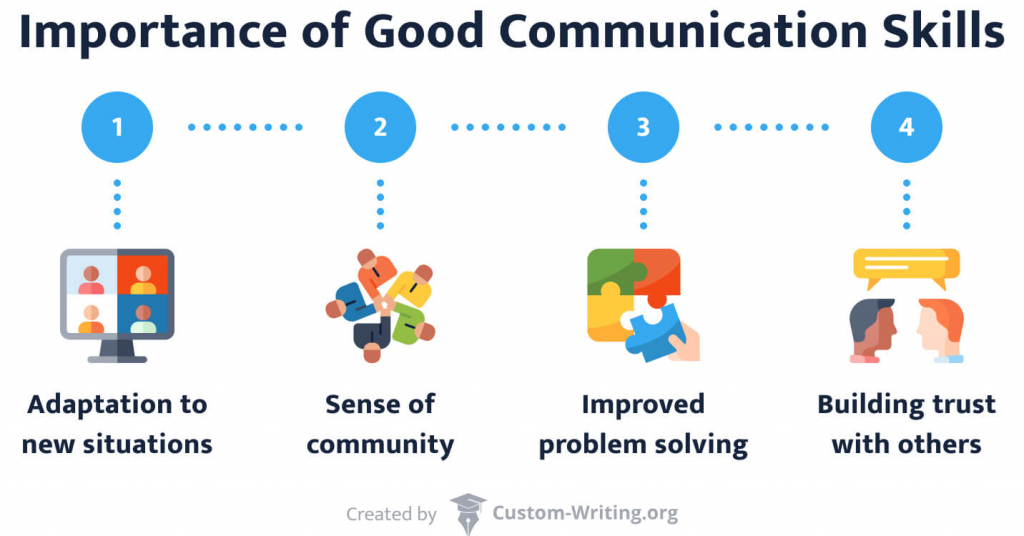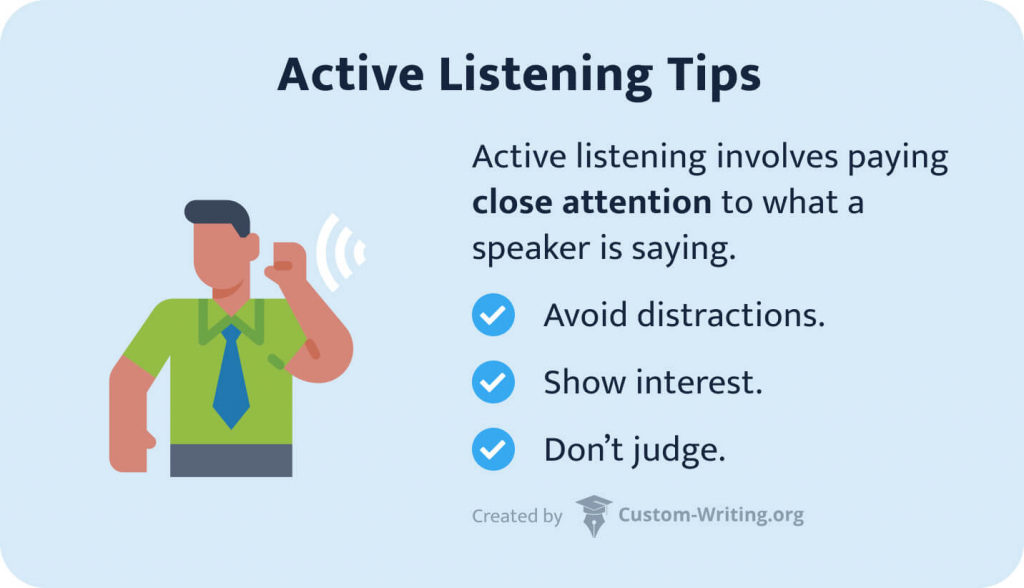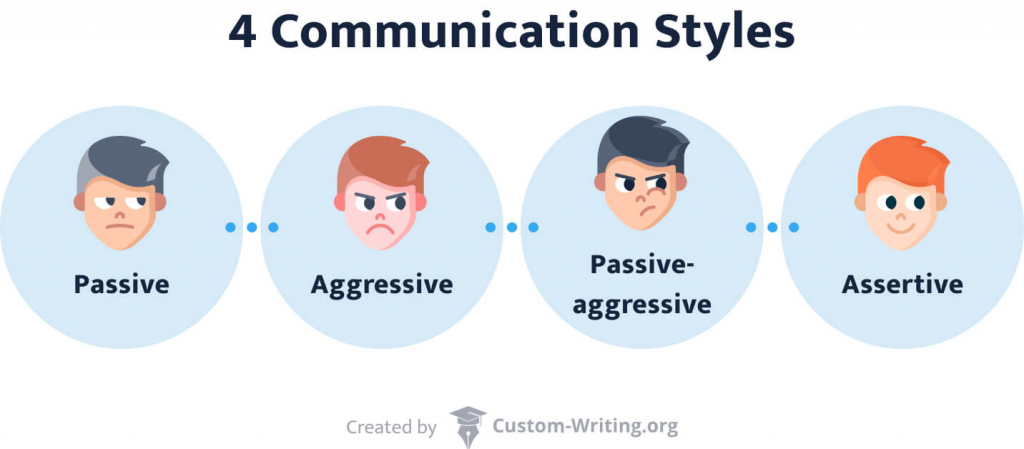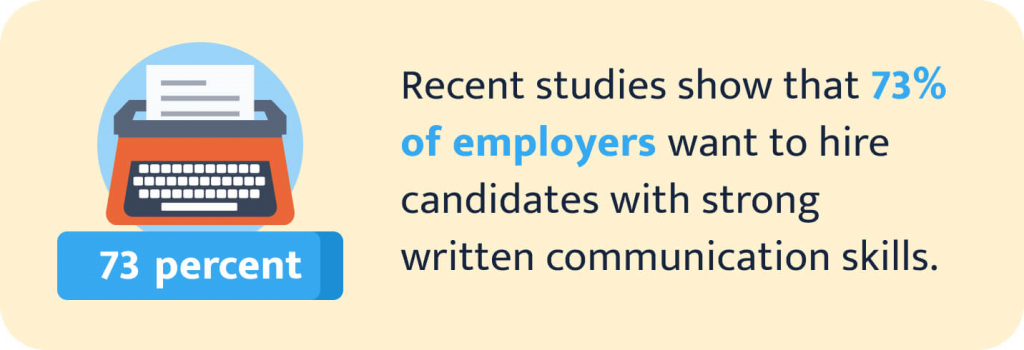It’s impossible to imagine people’s day-to-day lives without the primary facilitator of human interactions: communication. It comes in numerous shapes and forms, all meant to help us connect, offer our opinions, and share our feelings.
To communicate effectively, you should possess a specific set of skills. They are the key to your success, both personal and professional. After all, we all speak at least 7000 words per day! So, why not make them all count?

Keep reading this article by our custom-writing team to learn more about improving your communication skills. As a bonus, we’ve included some handy resources that will help you further upgrade your abilities.
💬 What Are Communication Skills?
Communication skills are a set of abilities that help us receive and transmit information. We use them continually, and their efficacy often determines our relationships with others. Whether texting, speaking on the phone, or talking face-to-face, the quality of your communication skills either help or hinder you.
Whenever you converse with someone, this is what happens:
- You convey your idea.
- The other person receives it, interprets it, and responds.
- You receive the response and analyze it.
- Then you reply.
This basic pattern repeats until the close of your discourse. Good communication skills play an integral role here; they help you deliver your point so the other person understands it clearly. They also aid in understanding the outside perspective.
4 Types of Communication Skills
Communication is not as elementary as it may appear. It has at least 4 different modes, which require different types of skills:
- Listening skills are integral to perceiving the other person’s ideas correctly.
- Verbal skills help you transmit your message. They refer not only to words but also to pitch and tone of voice.
- Writing skills allow you to convey your thoughts on paper.
- Interpersonal skills assist you in understanding your audience and adapting accordingly.
☝️ The Importance of Communication Skills in the Workplace & Life
You might be wondering: “Should I bother with upgrading my communication skills at all? Are they worth it?”
Absolutely! Here is why:

- They help you readjust to new situations. Modes of communication are continuously changing. Today, virtual interactions tend to replace face-to-face meetings, while previously phone calls were more common. Good written and verbal communication skills will help you adapt to these changes seamlessly.
- They facilitate a sense of community. It’s always nice to feel included, whether in school or in workplace. A sense of belonging brings a team together and encourages productivity.
- They let you solve problems efficiently (and avoid them altogether). Listening attentively to your opponent and clearly conveying your message can prevent escalating conflict. If the problem has already arisen, the same set of skills will help you settle it.
- They help build trust. People will be drawn to you if you are an empathic listener with a non-judgmental attitude.
🏆 16 Basic Communication Skills & How to Improve Them
Now that you know about the importance of clear and concise expression, let’s see how you can cultivate it. We will now go over 16 basic skills that will help you excel in every mode of communication.
1. Learn to Listen Actively
Active listening is a fundamental communication skill. It dramatically affects the quality of your relationships with other people. If you’re engaged in a conversation, you not only hear the words but also understand the message behind them.
These excellent tips will help you become an active listener:
- Avoid distraction. Look directly at the speaker, and don’t let anything divert your attention from the discourse. Repeating the words in your mind is an excellent way to stay concentrated.
- Acknowledgment is important. An occasional nod, smile, or short comment will show the other person that you are actually listening.
- Leave judgment aside. Allow the person to finish before asking questions or expressing any contention.

2. Have Empathy
Empathy is a great way to establish a connection. The core of empathic communication is the willingness to listen and the readiness to understand the perspective of others.
To communicate with genuine understanding, try the following:
- Reflective listening. Consider why this person behaves in a certain way and what they feel. You may try to verbalize their feelings back to them to show that you have heard and understood them.
- Accountability. It’s crucial to remember that you are always responsible for the effect your actions and words have on other people. Make sure to never shrink from this responsibility!
3. Be Patient
Patience in communication stimulates active listening and empathy. You listen to someone’s idea and try to understand it even if you’re angry or bitter. Doing it will also prevent you from making hasty decisions.
Try this to become a patient listener:
- Don’t interrupt the speaker. Let them finish before asking questions or commenting. Doing so will promote better understanding of your opponent and allow you to adjust your response accordingly.
- Let the other person interrupt you. We know what you’re thinking: it’s irritating and distracting when people do that. Still, letting your listeners say what they are going to say anyway will save you time and inform you about their concerns.
- Slow down. If you’re getting impatient with your opponent, take a deep breath and then try to relax as much as possible.
If this skill sounds challenging to master, remember that practice is vital. Over time, it will become second nature!
4. Maintain a Positive Attitude
It’s simple. Everyone loves to communicate with a positive person, so it’s best to try to be one. With an optimistic approach, communication issues are much easier to resolve.
To improve your attitude, try the following:
- Practice helpful self-talk. Do you get overwhelmed by negative thoughts? Try replacing them with positive affirmations and repeating them daily.
- Meditate. It’s not as time-consuming as you may think. Even 5 minutes of meditation every day can do wonders for your mind. Don’t know where to begin? Try Headspace, Calm, or Healthy Minds Program apps.
- Watch for triggers. Pay attention to people or situations that provoke a string of negative thoughts. Try to change and avoid whatever you can.
5. Be Open-Minded
Being open-minded means being perceptive to other people’s thoughts, ideas, and opinions. It is among the most basic interpersonal communication skills.
Here are some helpful pieces of advice:
- Don’t be afraid of change. Even if it’s unpleasant, try to see it as an opportunity to learn and grow.
- Make mistakes. Allowing yourself to fail will help you see the situation from another perspective.
- Don’t try to have all the answers. It’s impossible to be an expert in everything. Be open to new ideas and let others teach you something!
6. Give and Receive Feedback
Feedback is an integral part of communication in the workplace and college. It is usually meant to encourage or criticize some behavior. Good feedback shows that your message has been heard and understood.
- Giving feedback. When you do it, try to concentrate on the person’s behavior and your response to it. Stay friendly and maintain a positive attitude. Do not try to criticize the personality or character traits of others; that’ll only offend.
- Receiving feedback. This is another skill you should possess to become a great communicator. Listen carefully, focus, and understand what you are being told rather than what you’re going to reply. Work on your emotional intelligence to control your response, and try not to take criticism too personally.
7. Understand Different Communication Styles
A helpful strategy for communicating with others effectively is understanding their communication style. There are four types of communicators that you may encounter:

- Passive. Such communicators are indifferent, indecisive, and comfortable to speak to if a conflict arises. Their lack of expression often leads to misunderstanding.
- Aggressive. Such people are loud, demanding, and always trying to have their way. They tend to be rude and unpredictable.
- Passive-aggressive. Communicators of this type are manipulative and unreliable. Such people often seem passive at first, but you may notice their sarcastic replies and their habit of muttering to themselves instead of confronting their opponents directly.
- Assertive. Such people are good listeners. They clearly express their thoughts and are willing to consider the needs of others.
Assertive communicators are considered best (more on that later.) Overall, having understanding and a positive attitude will help you cope with any type of communicator.
8. Be Assertive
Assertiveness is the ability to express yourself clearly, considering the needs and emotions of others. It helps you gain respect and self-confidence. This skill is central to building healthy relationships and creating win-win situations.
If you are not an assertive communicator yet, learn how to be one by following our tips:
- Respect the people you talk to. Understand and acknowledge their needs and emotions. It’s also essential to refrain from judgment.
- Use “I” statements. This is the best way to convey your thoughts without sounding accusative or offensive.
- Don’t hesitate to say “no” if needed. You don’t have to make excuses. When giving explanations, keep them brief and clear.
- Watch your emotions. Try to remain calm, even, and firm. Make sure not to raise your voice or use offensive language.
9. Practice Responsiveness
Being responsive means providing a timely response to any message. This skill is relatively simple but it hardly receives enough attention. Mastering it will improve your relationships with teachers, employer, and friends.
To be responsive, do the following:
- Take time to answer all your emails or texts. Even if you are not sure what to reply, a simple “Let me get back to you later” is a step to improve your interactions.
- Be punctual. After all, nobody likes it when someone is late. Concerning messages and phone calls, make sure not to delay your answer for more than 48 hours. The quicker you respond, the better.
10. Ask Questions
Information is what all communication is built upon. The best and most straightforward way to get information is to ask questions.
This is how to do it properly:
- Ensure your questions are appropriate and timely. Is your inquiry respectful? Are you the right person to ask this? If not, it’s best not to address it.
- Use pauses. To stress the significance of your question, wait 3 seconds before asking it.
- Ask questions when making a new acquaintance. It’ll demonstrate your interest and let the other person feel more comfortable.
11. Use Humor
Humor is a fantastic tool that can get you out of a problematic situation, set up friendly terms with your colleagues, and help you become popular in your friend circle. The tricky part is that the same tool, if misapplied, can stir trouble
So, here’s what you should do:
- Don’t take yourself too seriously. The ability to poke fun at yourself makes people around you more comfortable.
- Make a joke to break the tension in an awkward situation. A good laugh helps loosen up.
- Stay positive. Make sure your jokes are not humiliating or offensive. It’s also best to refrain from sarcasm.
12. Hone Your Writing Skills
Written communication is a staple of modern life. People constantly write texts, emails, social media posts, essays, documents, and much more.
All this requires the ability to articulate ideas effectively through writing. And when it comes to your career, research shows that 73% of employers look for employees with solid written communication skills.

Want to improve yours? Follow these tips:
- Write every day. Just do it, no matter what type of writing you choose (email, formal letter, journaling, etc.)
- Use online tools. Popular software for written communication includes Word, Notion, and Trello. Mastering them will surely impress your future employer!
- Proofread. Before sending an important message, re-read it. Check grammar and readability: Grammarly may assist you with that.
13. Use Body Language
Nonverbal cues are key to effective in-person communication. In some cases, what you said may count less than how you said it. People often read your body language unconsciously, which determines their attitude toward you.
Here’s how to use this to your benefit:
- Pay attention to your facial expressions and gestures. Note the reaction they provoke. It’s also helpful to observe the body language of others.
- Maintain healthy eye contact. It will help you promote trust and see the immediate reaction to your words. But don’t stare; that makes people nervous.
- Smile. This is the easiest way to show confidence and contentment.
14. Balance the Tone & Volume of Your Voice
Tone and volume significantly affect how others perceive you. A flat, quiet voice bores people, and a loud, aggressive one tends to annoy. Try to find the right balance to make your listeners comfortable.
Here’s how to do it:
- Record yourself. Listen and analyze the recording. Do you like what you hear? What could you change?
- Choose your approach depending on the situation. Another helpful practice is to adjust your delivery to the circumstances and impression you want to make.
15. Express Yourself Clearly
Misunderstanding causes countless unnecessary conflicts. To prevent them, do your best to express yourself clearly.
That’s how you can do it:
- Avoid jargon. Technical words and phrases are challenging to understand outside professional circles. Eliminate jargon from your speech so that everyone knows what you are talking about.
- Keep your message short and simple. Avoid including redundant details.
- Choose your medium wisely. If you simply want to send a message, an email or memo may be most appropriate. Need more engagement? Organize a video conference or personal meeting.
16. Practice Self-Improvement
Continual self-improvement is the key to success. If there any abilities you need to upgrade, then define your goal and start working on it! Take baby steps and practice daily. Make a habit of it, and soon you’ll notice that your life, career, and relationships with others improve.
🔮 The 7Cs: The Secret to Effective Communication
There is a secret that will help you effectively transmit any message. It’s known as the 7Cs of communication, and we’re going to tell you all about it.
In simple words, the 7Cs are the fundamental principles required to make your communication comprehensible and transparent.
The 7Cs stand for:
- Clear. Know exactly what you want to say. Use plain language and avoid any ambiguity.
- Correct. Ensure your language is free of grammar and spelling mistakes.
- Concise. Stick to the point and avoid using more words than required to describe your idea.
- Coherent. Double-check if your message is logically structured. Be consistent in tone, voice, and style.
- Concrete. Be exact and corroborate your arguments with solid facts.
- Complete. Include details necessary to make your message clear for everyone.
- Courteous. Always remain polite and respectful. It’s always good to deliver your message in a friendly, honest, and empathetic manner.
Check out this infographic to get a better idea of the 7 Cs:

🗣️ Communication Difficulties & How to Overcome Them
Developing communication skills and remembering the 7Cs will definitely bring excellent results. But to perfect your communication, you may need to remove certain barriers.
Communication barriers are issues that can occur at any stage and undermine your efforts. But there’s always a way to cope with them! Let’s take a closer look:
- Physical barriers.
These include things that are easy to control, like noisy backgrounds, or those that require special attention, like speech impairments. You can overcome these barriers if you listen more attentively and don’t let yourself get distracted. - Psychological barriers.
Stress, anger, and low self-esteem always affect the way people communicate. Practicing positivity can help you overcome this barrier. - Cultural differences.
If a person you’re conversing with has a different cultural background, you may stumble upon misunderstandings. The key to removing this barrier is patience and empathy. - Lack of trust.
It’s hard to convey your message when your listeners doubt your words. Practicing assertiveness will help you handle with the issue. - Being judgmental.
You don’t get satisfying results if you are focused on judging people. Instead, try to keep an open mind. - Showing no enthusiasm.
Speak dully and show no interest in the information you deliver, and your listeners will fall asleep. Mastering body language and cadence can improve this situation.
🎁 BONUS: Best Books about Communication Skills
Want to train your skills even further? We’ve got a bonus list of helpful resources for you! Check out these top 4 books about communication skills:
- Communication Essentials: The Tools You Need to Master Every Type of Professional Interaction by Trey Guinn.
This book contains a step-by-step guide to becoming a great communicator. Each chapter includes a lot of anecdotes, exercises, and insights to enrich your learning. At the end, you will find an essential takeaway that sums up everything you have read. - 21 Days of Effective Communication: Everyday Habits and Exercises to Improve Your Communication Skills and Social Intelligence by Ian Tuhovsky.
This book contains a practical guide that will show you how to develop good communication habits and eliminate bad ones in just three weeks. The author shares tips and secrets that will help you enjoy your immediate improvement. The book does not include lengthy explanations or professional jargon: it’s just simple, straightforward exercises and actionable steps. - 4 Essential Keys to Effective Communication in Love, Life, Work—Anywhere! Including the “12-Day Communication Challenge!” by Bento C. Leal III.
Can a few simple skills completely change your life and relationships? The author of this book says “yes!” The book offers an easy how-to guide. You will also find a 12-day communication challenge in the final chapter that will help you with your practice. - Communication Skills: A Practical Guide to Improving Your Social Intelligence, Presentation, Persuasion and Public Speaking by Ian Tuhovsky.
Here the author outlines common communication obstacles and how to avoid them. He also teaches the reader how to manage conflict, predict the behavior of others, give and receive feedback, and much more.
Good communication skills are vital for success in any area of your life. Try to practice them now, and you will soon see improvement!
Have any suggestions? Share your ideas in the comments!
🔍 References
- Top 10 Communication Skills for Career Success: Indeed
- 30 Communication Feedback Examples: BetterUp
- Why Good Communication Is More Important Than Ever Before: Top Universities
- 4 Types of Communication Styles: Alvernia University
- Being Assertive: Reduce Stress, Communicate Better: Mayo Clinic
- Eight Things You Can Do To Improve Your Communication Skills: Harvard University
- 12 Communication Skills That Will Advance Your Career: Northeastern University
- 14 Proven Ways to Improve Your Communication Skills: Enterpreneur
- 6 Ways to Improve Your Communication Skills at Work: Southern New Hampshire University
- Communication Skills for Your Family: University of Delaware
- Effective Communication: Help Guide
- How to Improve Communication Skills for Workplace Success: Glass Door
![How to Deal with FOMO in College [+Turn It into JOMO]](https://custom-writing.org/blog/wp-content/uploads/2022/10/smiling-african-student-pointing-with-pencil-laptop-screen-concentrated-blonde-woman-glasses-propping-chin-with-hand-while-working-with-computer-office-1-284x153.jpg)

![How to Get Perfect Letters of Recommendation for College [Guide]](https://custom-writing.org/blog/wp-content/uploads/2022/08/NA_SEP._14-284x153.jpg)

![How to Search the Web Effectively [For Students]](https://custom-writing.org/blog/wp-content/uploads/2022/08/hand-touching-with-search-icon-search-engine-optimisation-seo-concept-find-information-by-internet-connection-1-284x153.jpg)
![Top 25 Gadgets You Need to Study Smarter [from $20]](https://custom-writing.org/blog/wp-content/uploads/2022/06/sad-female-workaholic-keeps-hands-chin-busy-making-project-work-studies-papers-wears-elegant-white-shirt-sits-desktop-unknown-people-stretch-hands-with-notes-alarm-clock-smartphone-1-284x153.jpg)





